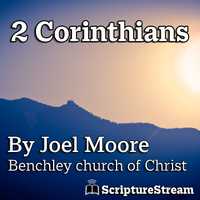[Note: Due to technical difficulties, the recording of the beginning of this class was lost. My apologies! - MRW]
Introduction to 2 Corinthians
- Notable verses
- Corinth, a city of Achaia
- Ancient Greek city destroyed by Rome in 146 B.C., then refounded as a Roman colony in 44 B.C. by Julius Caesar.
- Important crossroads between the Greek mainland and Peloponnesian peninsula
- Home to many “gods” and “lords” (I Corinthians 8:5)
- Jewish presence (Acts 18:4)
- Other cities of Achaia: Athens and Cenchrea (Acts 17; 18:18)
- Acts 18:2-3
- Background
- Paul spent 1.5 years in Corinth in the late 40s/early 50s (second journey).
- I Corinthians written about A.D. 55 from Ephesus (third journey)
- Paul anticipated another visit to Corinth (I Corinthians 16:2-3, 6)
- Painful visit (II Corinthians 2:1)?
- II Corinthians written about a year later from Macedonia (third journey)
- II Corinthians 13:1
- Three-month stay in Greece after writing II Corinthians (Acts 20:2-3)
- Wrote Romans during that visit.
- Brief review of I Corinthians
- Three main sections of II Corinthians
- II Corinthians 1-7 – Apologetic (explanation and defense)
- II Corinthians 8-9 – Hortatory (exhortation)
- II Corinthians 10-13 – Polemical
- II Corinthians overview
- Very personal letter from Paul to Christians in Achaia.
- Paul used a variety of methods to convince and exhort them.
- Paul’s work as an apostle
- John 15:26-27; 16:8-11
- Acts 9:15-16
- “Instrument” from the Greek, skeuos, meaning vessel (II Corinthians 4:7)
- Acts 20:22-24
- I Corinthians 15:8-10
- II Corinthians 4:1; 5:18; 6:3
- I Timothy 1:12-13, 16
- Class goals
- Greater understanding of the text with a goal toward personal application and improvement.
- Local authority and individual Christian’s relationship with apostolic authority.
- Class expectations
II Corinthians 1:1-2
- Paul immediately calls himself an apostle.
- II Corinthians 8:23 – Titus is called an apostle in Greek, but usually translated “messenger.”
- Paul was more than just a messenger. He was an apostle in the matter of the original twelve.
- II Corinthians 1:2 - Compare II Corinthians 13:4
- “Lord Jesus Christ” – this phrase is used a number of times
- “Lord” – refers to His Deity
- “Jesus” – refers to His time as a man
- “Christ” – refers to His role as Messiah
- “Lord Jesus Christ” – this phrase is used a number of times
